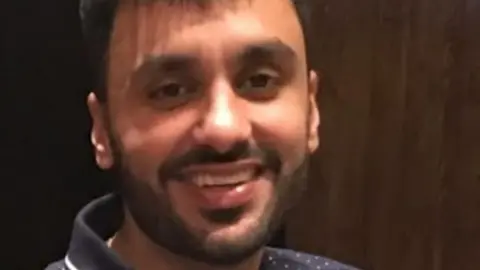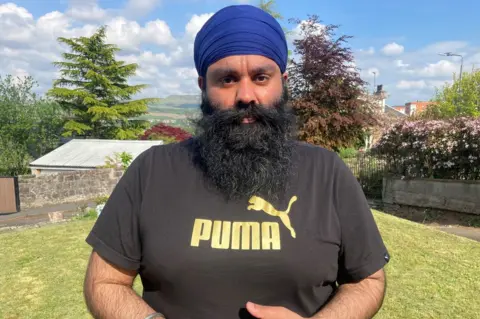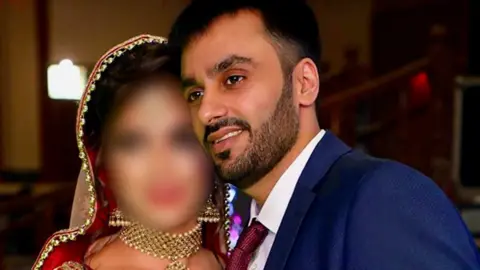UN group: No legal basis for Jagtar Singh Johal's detention in India
 Free Jaggi Campaign
Free Jaggi CampaignThe detention of a Scottish Sikh man in India has no legal basis, according to human rights investigators at the UN.
Jagtar Singh Johal, from Dumbarton, was arrested on alleged terror offences in 2017 and is yet to stand trial.
Now the United Nation's Working Group on Arbitrary Detention has said that Mr Johal has been detained "arbitrarily" and should be released immediately.
The Indian government said his detention was based on "sufficient prosecutable evidence".
It also said Mr Johal's rights had been "duly honoured".
The working group is a panel of experts which investigates whether a person's detention breaches accepted standards in international human rights law.
'Violations of human rights'
In a damning new finding on the case, it stated that there had been "violations of international human rights norms and standards in the arrest and detention of Mr. Johal" as well as "multiple violations of [his] right to a fair trial."
It called on the Indian government "to take urgent action to ensure the immediate unconditional release of Mr. Johal" and "accord him an enforceable right to compensation and other reparations, in accordance with international law."
Gurpreet Singh Johal has campaigned for his brother's release since he was first arrested and has also criticised the UK government's response to the case.
He told BBC Scotland: "We've known from the start that there's no good reason for Jagtar's imprisonment and the Indian authorities haven't produced any evidence against him.
"The UK government hasn't listened to us, but perhaps it will listen to the UN and call for his release.
"There have been so many setbacks but on a day like this, we're dreaming of the moment my brother steps off a plane in Scotland to be reunited with his family."

Mr Johal was arrested in India's northern region of Punjab in November 2017 while celebrating his wedding.
His family said he was snatched from the street by plain-clothes officers while out shopping with his wife and had a bag placed over his head.
He has remained in detention in a series of Indian prisons ever since, accused of funding the purchase of weapons used to assassinate a number of right-wing Hindu religious and political leaders in the Punjab.
'Beaten, electrocuted and tortured'
Almost five years on, Mr Johal has not stood trial in any of the cases against him and has insisted he has been "falsely implicated" in the killings.
He alleges that he was beaten, electrocuted and tortured while in the initial custody of the Punjab Police, and that he was forced to sign blank documents.
In December 2017, a month after his arrest, the 35 year-old appeared in a video from custody - broadcast on Indian TV outlets - allegedly confessing to participating in the crimes.
His family and supporters say this confession was coerced and Mr Johal has been targeted by the Indian authorities due to his Sikh faith and his online activism highlighting the historical persecution of Sikhs in the Punjab.
 Free Jaggi Campaign
Free Jaggi CampaignThe Indian government denies Mr Johal has been tortured or mistreated and says there have been no human rights violations against him.
But the new report by the UN Working Group's investigators directly calls that into question.
It found Mr Johal had been "interrogated repeatedly in the absence of legal counsel and in incommunicado detention" saying that any confession obtained in these conditions should not be admissible in any trial.
It also said he was "not presented with a warrant at the time of his various arrests… was denied the presumption of innocence; was subjected to torture and refused medical treatment; was not granted prompt consular assistance; was not brought promptly before a tribunal; and was judged behind closed doors without the presence of his lawyer and his diplomatic representative."
On the allegations of torture, the group says "the burden of proof rests on the government to prove that [Mr Johal's] statements were given freely, which it has not done in this case."
'Discriminatory grounds'
It added that Mr Johal's case had now been forwarded to the UN's Special Rapporteur on torture and other cruel, inhuman or degrading treatment or punishment for further investigation, and that it wanted an update on his release within six months.
Finally, the investigators concluded that Mr Johal's detention without trial was "on discriminatory grounds, owing to his status as a human rights defender and based on his political activism, religious faith and opinions," something Mr Johal's family have asserted since he was first arrested in 2017.
The Indian government said under the country's laws no discrimination was made based on religion.
Mr Johal is supported by the legal and human rights charity Reprieve. Its director Maya Foa said the UN Working Group's report was a "watershed moment" in the case and called on the UK government to do more to achieve his release.
She told BBC Scotland: "[It] means is his detention is unlawful."
"There is no longer any excuse for the government's continued failure to call for Jagtar's release and return. When a British citizen is tortured and held in pre-trial detention for four years, facing a potential death sentence, the prime minister's responsibility is clear. What is Boris Johnson waiting for?"
A UK government spokesperson said: "We have consistently raised our concerns about Mr Johal's case with the government of India, including his allegations of torture and mistreatment and his right to a fair trial.
"The prime minister raised the case with his Indian counterpart Narendra Modi, when they met in Delhi on 22 April."
